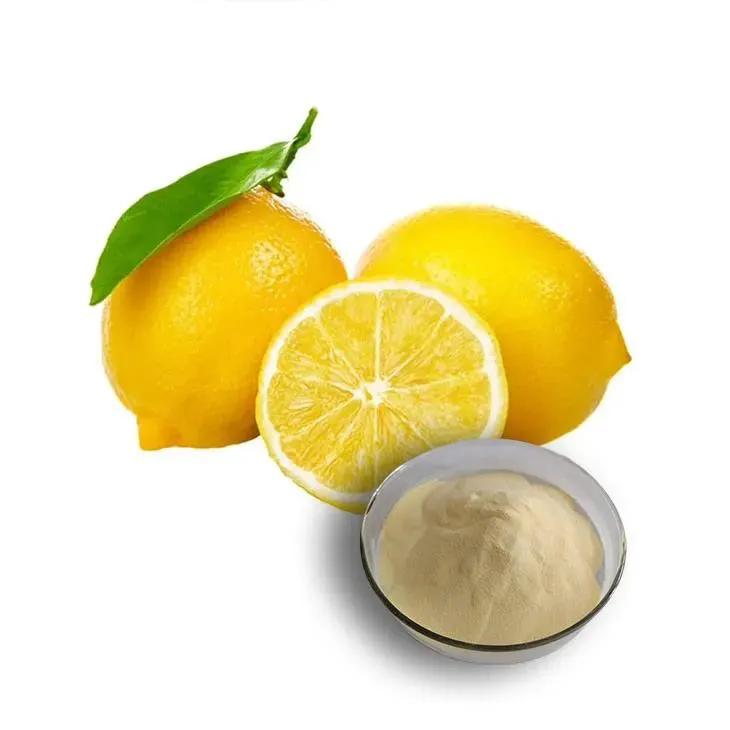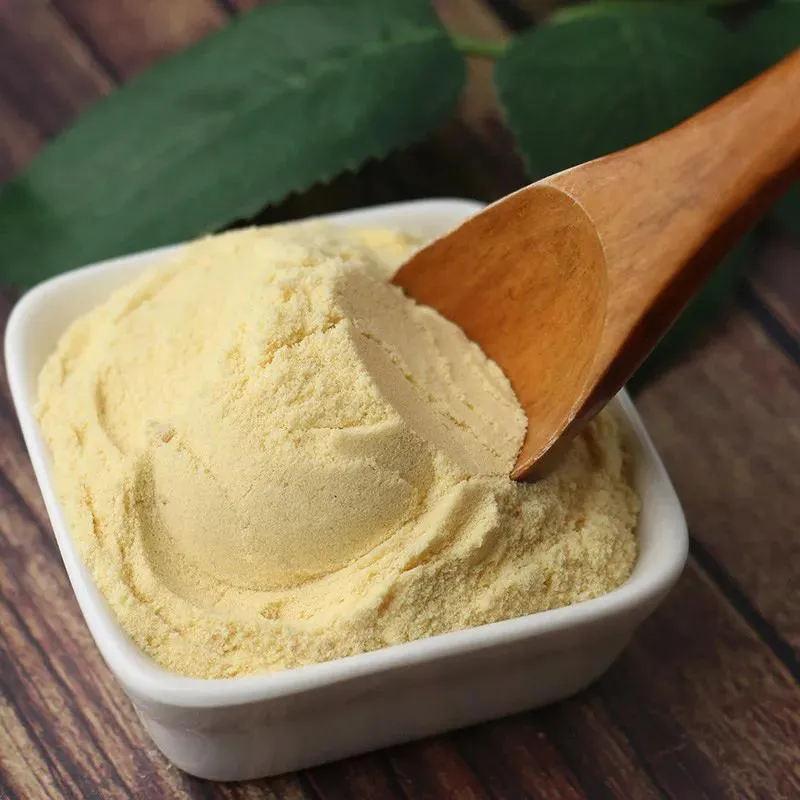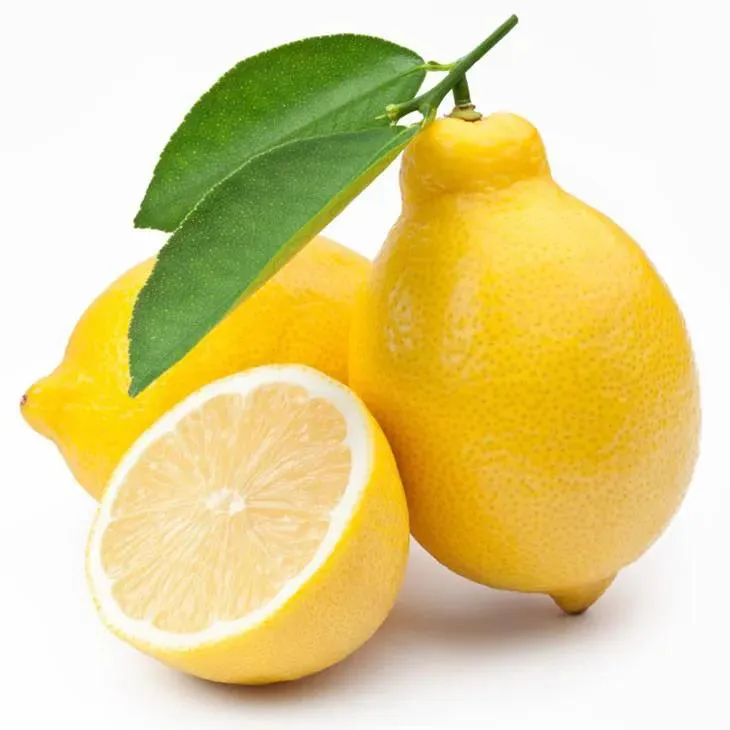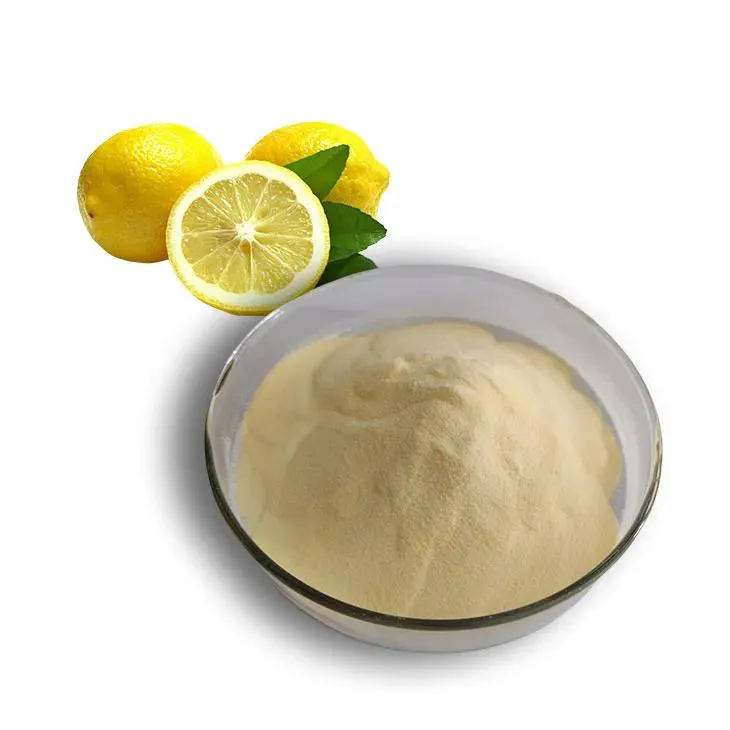- 0086-571-85302990
- sales@greenskybio.com
Four Main Methods for Extracting Lemon Juice Powder from Plants.
2024-12-10

1. Introduction
Lemon Juice Powder has gained significant popularity in various industries, including food, health, and botanical sectors. It offers a convenient way to incorporate the tangy and refreshing flavor of lemons, along with their potential health benefits, into a wide range of products. Extracting Lemon Juice Powder from plants involves several intricate methods, each with its own set of procedures and advantages. In this article, we will explore four main methods in detail.

2. Method 1: Solvent Extraction
2.1. The Principle
Solvent extraction is based on the principle that different substances have different solubilities in solvents. For Lemon Juice Powder extraction, a suitable solvent is chosen to dissolve the components of the lemon juice from the plant material. Commonly used solvents include ethanol, methanol, or water. The solvent penetrates the plant cells and selectively dissolves the desired compounds such as citric acid, flavonoids, and essential oils.
2.2. The Procedure
- First, the lemon plants are harvested and the relevant parts, such as the fruits, are carefully selected and cleaned. This is crucial to remove any dirt, debris, or contaminants that could affect the quality of the extract.
- Next, the plant material is crushed or ground into a fine pulp. This increases the surface area of the material, allowing for better contact with the solvent.
- The solvent is then added to the crushed plant material in a suitable ratio. For example, if using ethanol, a typical ratio might be 1:5 (plant material to solvent by weight).
- The mixture is stirred thoroughly and allowed to stand for a certain period, usually several hours to a few days, depending on the nature of the plant material and the solvent. During this time, the solvent extracts the active components from the plant.
- After extraction, the mixture is filtered to separate the liquid extract (containing the dissolved lemon juice components) from the solid residue. Filtration can be done using filter paper, a Buchner funnel, or other filtration devices.
- Finally, the solvent is removed from the extract. This can be achieved through evaporation, either at room temperature under reduced pressure or at an elevated temperature in a controlled environment. The resulting residue is the lemon juice powder or a concentrated form that can be further processed into powder.
2.3. Advantages and Disadvantages
Advantages:
- Solvent extraction can be highly selective, allowing for the extraction of specific components of the lemon juice. For example, it can effectively extract flavonoids which are important for their antioxidant properties.
- It can be used on a large scale in industrial settings, providing a relatively efficient way to obtain lemon juice powder.
- The use of solvents may pose safety risks, especially if they are flammable or toxic. Adequate safety measures need to be in place during the extraction process.
- Some solvents may also extract unwanted substances along with the desired lemon juice components, requiring further purification steps.

3. Method 2: Cold - Press Extraction
3.1. The Principle
Cold - press extraction is a mechanical method that takes advantage of the natural structure of the lemon plant material. By applying pressure, the juice is squeezed out from the cells of the plant without the use of heat or solvents. This method aims to preserve the natural integrity and properties of the lemon juice as much as possible.
3.2. The Procedure
- The lemons are first washed thoroughly to remove any surface dirt. It is important to handle the lemons gently to avoid bruising, which could lead to the release of enzymes that may affect the quality of the juice.
- The lemons are then cut into halves or quarters, depending on the size and the equipment used for pressing. For small - scale extraction, a manual citrus press can be used, while for larger - scale operations, industrial - grade cold - press machines are available.
- The cut lemons are placed in the press, and pressure is gradually applied. The pressure forces the juice out of the lemon cells and through a filter or strainer to separate the juice from the pulp and seeds.
- Once the juice is extracted, it can be concentrated by removing some of the water content. This can be done through techniques such as vacuum evaporation at low temperatures to preserve the flavor and nutritional components of the lemon juice.
- Finally, the concentrated lemon juice can be converted into powder form through drying methods such as spray drying or freeze - drying. Spray drying involves spraying the concentrated juice into a hot air stream, while freeze - drying involves freezing the juice and then removing the ice by sublimation under vacuum.
3.3. Advantages and Disadvantages
Advantages:
- Cold - press extraction produces a high - quality lemon juice with a more natural flavor and aroma compared to other methods. It retains more of the original nutrients and bioactive compounds since no heat or solvents are used during the initial extraction.
- It is a relatively clean and simple method, with fewer potential contaminants compared to solvent - based extraction.
- The yield of lemon juice from cold - press extraction may be lower compared to solvent extraction methods, especially if the plant material is not processed optimally.
- It requires more manual labor or specialized equipment for large - scale production, which can increase the cost.

4. Method 3: Supercritical Fluid Extraction
4.1. The Principle
Supercritical fluid extraction utilizes a supercritical fluid, most commonly carbon dioxide ($CO_{2}$), as the extracting agent. A supercritical fluid has properties between those of a gas and a liquid. At supercritical conditions (above a certain temperature and pressure), $CO_{2}$ can penetrate the plant cells and dissolve the lemon juice components effectively. The solubility of the components in the supercritical $CO_{2}$ can be adjusted by changing the pressure and temperature, allowing for selective extraction.
4.2. The Procedure
- The lemon plant material is prepared by cleaning and grinding it into a suitable particle size. The proper preparation of the material is essential for efficient extraction.
- The supercritical $CO_{2}$ extraction system is set up. The system consists of a high - pressure pump to pressurize the $CO_{2}$, a temperature - controlled extraction vessel where the plant material is placed, and a separator to separate the extracted components from the $CO_{2}$.
- The $CO_{2}$ is pressurized and heated to reach its supercritical state. The supercritical $CO_{2}$ is then passed through the extraction vessel containing the lemon plant material. As it passes through, it extracts the lemon juice components such as citric acid, essential oils, and flavonoids.
- After extraction, the supercritical $CO_{2}$ with the dissolved components is passed into the separator. By changing the pressure and/or temperature in the separator, the solubility of the components in the $CO_{2}$ is reduced, causing them to precipitate out. The $CO_{2}$ is then recycled back to the high - pressure pump for reuse.
- The precipitated lemon juice components can be further processed into powder form. This may involve drying or other purification steps depending on the desired final product.
4.3. Advantages and Disadvantages
Advantages:
- Supercritical fluid extraction using $CO_{2}$ is a relatively clean and environmentally friendly method. $CO_{2}$ is non - toxic, non - flammable, and leaves no residue in the final product.
- It offers high selectivity in extraction, enabling the extraction of specific components with precise control over the extraction conditions.
- Since the extraction is carried out at relatively low temperatures, it helps to preserve the thermally labile components of the lemon juice, such as some of the essential oils and bioactive compounds.
- The equipment for supercritical fluid extraction is relatively expensive, which can limit its use in small - scale or budget - constrained operations.
- The process requires strict control of pressure and temperature, and any deviation from the optimal conditions can affect the extraction efficiency and quality of the product.

5. Method 4: Microwave - Assisted Extraction
5.1. The Principle
Microwave - assisted extraction is based on the principle of using microwave energy to heat the lemon plant material. Microwaves interact with the polar molecules in the plant cells, causing them to vibrate and generate heat. This internal heating promotes the release of the lemon juice components from the plant cells more quickly and efficiently compared to traditional heating methods.
5.2. The Procedure
- The lemon plant material is first prepared by washing, drying, and grinding it to a suitable size. This ensures that the microwaves can penetrate the material evenly.
- The ground plant material is placed in a microwave - safe container along with a suitable solvent (if required). In some cases, water can be used as the solvent, especially if the goal is to extract water - soluble components of the lemon juice.
- The container is placed in the microwave oven, and the microwaves are applied at a specific power level and for a certain duration. The power level and time need to be optimized based on the amount of plant material, the type of solvent (if any), and the desired extraction efficiency.
- During microwave irradiation, the plant material heats up, and the lemon juice components are released into the solvent (if present). After the microwave treatment, the mixture is allowed to cool.
- The cooled mixture is then filtered to separate the liquid extract containing the lemon juice components from the solid residue. If further purification is needed, additional steps such as centrifugation or chromatography can be carried out.
- Finally, the liquid extract can be dried to obtain the lemon juice powder. Drying methods such as spray drying or freeze - drying can be used as described in previous methods.
5.3. Advantages and Disadvantages
Advantages:
- Microwave - assisted extraction is a relatively fast method compared to traditional extraction methods. It can significantly reduce the extraction time, which is beneficial for large - scale production.
- It can also improve the extraction efficiency, as the internal heating generated by microwaves can break down cell walls more effectively, allowing for better release of the lemon juice components.
- The distribution of microwave energy may not be completely uniform, which can lead to inconsistent extraction results. Special care needs to be taken to ensure even heating of the plant material.
- There is a risk of overheating the plant material, which may cause degradation of some of the heat - sensitive components of the lemon juice. Careful control of the microwave power and time is required to avoid this.
6. Conclusion
In conclusion, the four main methods for extracting lemon juice powder from plants - solvent extraction, cold - press extraction, supercritical fluid extraction, and microwave - assisted extraction - each have their own characteristics. The choice of method depends on various factors such as the scale of production, the desired quality of the final product, cost considerations, and environmental concerns. For small - scale production with a focus on natural and high - quality products, cold - press extraction may be a suitable option. For large - scale industrial production with a need for high selectivity and efficiency, supercritical fluid extraction or solvent extraction may be more appropriate. Microwave - assisted extraction can be a good choice when fast extraction times are crucial. Understanding these methods and their advantages and disadvantages is essential for those involved in the production and utilization of lemon juice powder in the food, health, and botanical industries.
FAQ:
Question 1: What are the four main methods for extracting lemon juice powder from plants?
The four main methods may include solvent extraction, which uses a suitable solvent to dissolve the components related to lemon juice from the plant material; steam distillation, where steam is passed through the plant matter to extract volatile components; cold - press extraction, which mechanically presses the plant to obtain the juice - related substances without using heat; and enzymatic extraction, which utilizes specific enzymes to break down the plant cell walls and release the relevant substances for further processing into lemon juice powder. However, the specific details of these methods can vary depending on the nature of the plant and the requirements of the extraction process.
Question 2: Which method is the most cost - effective for extracting lemon juice powder from plants?
The most cost - effective method depends on various factors. Cold - press extraction might be relatively cost - effective in some cases as it does not require expensive equipment for heating or complex chemical solvents. However, if the plant material is difficult to press mechanically, solvent extraction could be more viable if a low - cost solvent can be used. Steam distillation may be more expensive due to the energy requirements for generating steam. Enzymatic extraction can also be costly as the enzymes themselves are expensive. Overall, it is necessary to consider the scale of production, availability of raw materials, and cost of equipment and chemicals when determining the most cost - effective method.
Question 3: Are there any environmental concerns associated with these extraction methods?
Yes, there are environmental concerns. Solvent extraction may use organic solvents that can be harmful to the environment if not properly disposed of. Steam distillation requires energy, usually from non - renewable sources, which can contribute to carbon emissions. Enzymatic extraction may involve the production and disposal of enzymes, which could have an environmental impact if not managed well. Cold - press extraction is generally more environmentally friendly as it does not involve the use of solvents or significant energy consumption, but waste management from the plant material after pressing still needs to be considered.
Question 4: How does the quality of lemon juice powder vary among different extraction methods?
The quality of lemon juice powder can vary significantly. Steam distillation may result in a product with a different flavor profile compared to cold - press extraction as the high heat can cause some chemical changes in the volatile components. Solvent extraction may leave traces of the solvent if not completely removed, which can affect the purity and quality of the powder. Enzymatic extraction can potentially produce a higher - quality product in terms of retaining more of the natural components as it is a more targeted method of breaking down cell walls. Cold - press extraction can preserve the freshness and natural taste of the lemon - related substances, but it may also contain more impurities from the plant material compared to other methods.
Question 5: Can these extraction methods be applied to other types of fruits or plants?
Yes, many of these methods can be applied to other fruits and plants. For example, solvent extraction can be used for a wide range of plants to extract various bioactive compounds. Steam distillation is commonly used for extracting essential oils from many different types of plants. Cold - press extraction can be adapted for other soft - fleshed fruits like oranges or grapefruits. Enzymatic extraction can also be used for plants with tough cell walls where traditional extraction methods may not be as effective, although the specific enzymes may need to be selected according to the nature of the plant material.
Related literature
- Advanced Techniques in Plant - Based Extract Production"
- "The Science of Fruit Juice Powder Extraction"
- "Modern Methods for Botanical Component Extraction"
- ▶ Hesperidin
- ▶ citrus bioflavonoids
- ▶ plant extract
- ▶ lycopene
- ▶ Diosmin
- ▶ Grape seed extract
- ▶ Sea buckthorn Juice Powder
- ▶ Beetroot powder
- ▶ Hops Extract
- ▶ Artichoke Extract
- ▶ Reishi mushroom extract
- ▶ Astaxanthin
- ▶ Green Tea Extract
- ▶ Curcumin Extract
- ▶ Horse Chestnut Extract
- ▶ Other Problems
- ▶ Boswellia Serrata Extract
- ▶ Resveratrol Extract
- ▶ Marigold Extract
- ▶ Grape Leaf Extract
- ▶ blog3
- ▶ blog4
- ▶ blog5
-
Pure 85% Tomentil Extract.
2024-12-10
-
Citrus bioflavonoids
2024-12-10
-
Licorice Root Extract Powder
2024-12-10
-
Purple Sweet Potato Extract
2024-12-10
-
Reishi mushroom extract
2024-12-10
-
Horse Chestnut Extract
2024-12-10
-
Okra Extract
2024-12-10
-
Genistein
2024-12-10
-
Beta Carotene
2024-12-10
-
Lemon Juice Powder
2024-12-10
-
Feverfew Extract
2024-12-10




















